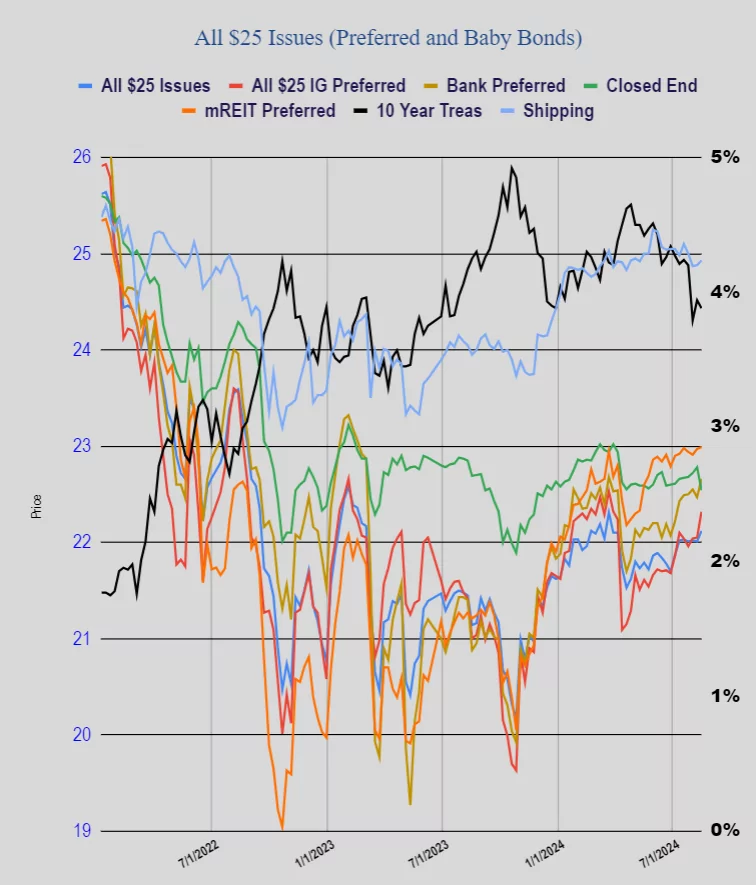I like boring—watching paint dry relative to equity and interest rate markets is always fine with me—I wish we could count of boring nothingness for years. Of course this is dreaming because it is in the interest of some market participants to drive prices way up and then bring it lower with a thud. The interests of ‘fast money’ folks seldom dovetails with the interest of us just trying to earn a fair return on our important dollars.
Last week we saw the S&P500 move in a range of 5324 to 5561 closing ner the high at 5554 which was up just over 4% from the week before. We are just 2 weeks out from the market panic, ‘the world is ending’, based upon singular miss on employment numbers. Well we are up greatly from the low that day of 5119–over 8% higher. The ’emergency’ rate cut called for by the Nervous Nellie’s would have been a great mistake and taken as a signal that there were greater problems (I.e. a huge global banker in trouble). A rate cut may be warranted, but not in a willy nilly fashion.
The 10 year treasury closed the week at 3.89% after trading in a range of 3.81% to 3.95% for the week. The close was 5 basis points lower than the previous week. Economic data for last week was pretty much on forecast–now particular the producer price index (PPI) and consumer price index (CPI). This week we don’t have any of the most important economic releases–but we do have the Fed chair speaking at the Jackson Hole meeting on Friday and I think he will continue to ‘set the table’ for a September rate cut–1/4% with 1/2% potential depending on the economic news released prior to the meeting (we will have employement, CPI and PPI released in September and will have the personal consumption expenditures (PCE) released on 8/30/2024).

The Federal Reserve balance sheet assets rose by about $2 billion last week–down occasional pause before the downtrend continues.
Last week we got a bit of a pop in the average $25/share preferred and baby bond as it rose by 11 cents. Investment grade issues rose 27 cents, bankers moved 19 cents higher. CEF preferreds fell 24 cents and mREITs were up 2 cents. Shippers were up a nickel.


Last week we had 1 new income issue price. mREIT Chimera Investment priced a new issue of baby bonds with a fixed coupon of 9.25%


I always thought resumes were a lousy way to hire people. As an employer I would hire people by talking shop, hearing their competence means more than hearing their resume.
Woops. that was an answer to a comment apparently posted in the wrong place. I’m not hired.
Martin Funny thing is I have been jumping around reading different comments and it made perfect sense as a follow up in my mind to what I have been reading.
LoL
CIMO is taking their time….
Just sold CIMN above par in anticipation of CIMO. Now don’t come in too high. or keep me waiting too long I’ll spend the money elsewhere.
Tim
There is a possible red flag for Wednesday: revisions to Enterprise based data for jobs may turn employment negative for the first quarter. This is a weak source for Goldman Research which is estimating a revision down of 500,000 jobs or more. What the Hell? This is a repetition of the revision in the late Spring for the third quarter of 2023. Why can’t we get reliable data. We survey polar bear births better than American hiring.
https://u.today/us-bureau-of-labor-statistics-job-data-revision-could-spark-crypto-market-turmoil
By now, the data revisions are such a pattern you’re expected to know that the data will be revised downward later at some point and trade the now.
Otherwise, how would we have volatility if everything was great all the time ?
?
I think this could be a BIGGIE!
Urge all to read it and think about what might happen if true
Won’t it possibly affect the “assured” September rate drop?
(Storm Warning Westie)
Seems to be hitting tech and software workers this time around being that these companies and people are a larger part of the economy. GM announced they gave notice to 1000 workers in their software division layoff notices this morning.
I was talking to a couple of CEOs of smallish silicon valley tech companies recently. They are happy tech layoffs are growing because they can focus their hiring on “trading up” in their employees in addition to normal growth.
They had a tough time hiring quality people during the pandemic and they hired whomever they could get.
Now, as things are getting a little better, they are hiring better people and letting some of the worst employees go. Not big enough layoffs to trigger WARN act notices, just a slow attrition of the dross – hunting down the quiet quitters and the incompetent.
One challenge is that as big companies are dumping employees, there are more people available, but a lot were let go because they just aren’t competent, so recruiters have to look hard for the gems.
I was walking through one company’s recruiting department and one of the gals (super competent -I know her from a prior employer) showed me some recent resumes from her “pile of shame”. Just terrible stuff. Full of obvious lies (like degrees from universities that don’t exist – one claimed the “University of Northern California, Los Angeles”), misspellings of prior employers, 10 page resumes from new grads, lots that were just gibberish (AI generated? Google translated?). Some weren’t even in English. She said they get an avalanche of resumes for every position they post, and they are using “AI” to try to kick out the worst and winnow out the relevant. She said the best candidates they get are still coming from referrals from current employees – but they can’t get everyone they need that way.
Modern layoffs are much easier than in past days, particularly for remote work from home folks. You turn off their corporate web access and send them an email telling them they have been laid off. Easy to do. Compare that to when you had to do layoffs in person. It is an acquired skill that is one of the hardest things you will ever do in life. Pull someone into your office or conference room that has been doing a good job on exactly what you told them to do and lay them off. I have seen many managers that could NOT do it. They got physically ill.
As for only “poor performers” being laid off, mostly fallacy IMO. If you have been in layoff planning meetings with management, every single manager states the case whey XYZ cannot be laid off. After a few rounds of that, the CEO and/or the CFO says “either you lay them off or your replacement will.” Does anybody really think all 15,000 folks that Intel is laying off are “poor performers.” About the same quantum mechanic odds as catching a tiger in your front yard cage.
One particular case sticks in my mind. Years ago a middle aged man with teenage kids was in my office trying to get hired. Had a BS, MS and PHD from MIT. Went to work for Bell Labs, yes the ones with all of the Nobel laureates working there. Laid off all the same. Kept asking myself: “What did this person do WRONG to get into this position?”
Just like investing has evolved to just a few clicks, so has laying off folks. And we consider BOTH to be progress?
To your point, Tex….. https://youtu.be/0EHKjlLeUFo?t=116
https://www.youtube.com/watch?v=888DJKMT8bw&ab_channel=RussellB.
Amen, Tex.
In my experience with tech layoffs, word comes down with a percentage which must be cut, the director holds a meeting, all employees are fitted to a performance grid, and the managers argue over who in the lowest decile (or whichever percentage has been mandated) will actually be laid off. In that lowest decile there always are lower performers but NEVER all of them.
There is an important financial lesson here that is not talked about enough. The laid off high tech people do have the right approach IMO. The number of millionaires, ten-millionaires, hundred-millionaires created by high tech jobs is something we have never seen before.
Go back say 50 years ago. The best and brightest tech folks went to work for Bell Labs, IBM, GE or TI. The guy that literally invented the integrated circuit at TI was Jack Kilby. Kind of an important discovery you might say. Later won a Nobel prize for it. His reward a few years later was something like a $5k bonus. No matter how smart you were and/or how hard you worked you were NOT going to get to be a millionaire in your twenty’s or thirty’s. Maybe by the time you got to 65, you would be worth $ 1 million.
Microsoft, Google, Facebook, Nvidia etc have made tens of thousand millionaires in their twenty’s and thirty’s. I know a thirty something that recently “retired” from one of them. Financially set for life, but free to do whatever else job wise they want. I recently heard about a young ~ $70k/year graphic artist that started at Nvidia a few years ago. Now worth $55 million. Name another industry where that is possible?
The financial message is simple: if you cannot entertain like Taylor Swift or throw a football like Patrick Mahomes and want the best odds of becoming rich, get a high tech job at a small company. Yeah, you might get laid off a few times. Yeah, you might work for a few companies that go belly up. But statistically you still have the best chance of striking it rich. Better than Wall Street. Better than Med School. Better than drilling oil wells. Better than working for large established, non-tech companies. A few executives at those companies will become rich, but how many starting graphic artists will? Zero. . . .
If you are young, have a low cost of living, have zero dependants, the gold rush is still alive and well. . .
And what percentage of these high tech employees are in the millionaire category? Same question for the finance field. A friend went from bank loan officer to millionaire in two years when he was hired by a Wall St firm.
Yes opportunities exist but no guarantees.
My nephew had a million dollars worth of stock from his bio startup company and that went to 0 with a bankruptcy.
True that those high income opportunities rarely happened 50 years ago unless you owned the company. Plenty of easy borrowed money these days for startups to spend.